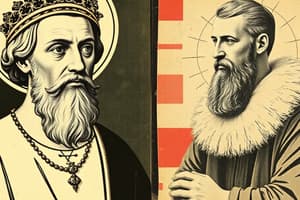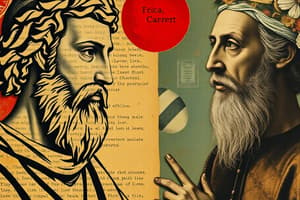Podcast
Questions and Answers
What concept did Aquinas borrow from John of Salisbury?
What concept did Aquinas borrow from John of Salisbury?
- The eternal city
- Supremacy of law (correct)
- Superiority of the church over the state
- Doctrine of original sin
How did Aquinas differ from Aristotle?
How did Aquinas differ from Aristotle?
- He rejected all forms of reasoning
- He modified doctrines that conflicted with Christianity (correct)
- He always prioritized faith over reason
- He denied the natural state of man
What was Saint Augustine's role in the Christian Church?
What was Saint Augustine's role in the Christian Church?
- The first Pope of Rome
- Founder of the monastic system
- Bishop of Hippo (correct)
- Archbishop of Milan
Which work is NOT attributed to Saint Augustine?
Which work is NOT attributed to Saint Augustine?
What major work is St. Augustine known for that addresses the defense of Christianity?
What major work is St. Augustine known for that addresses the defense of Christianity?
What period is often referred to as the formative period of Christian thought?
What period is often referred to as the formative period of Christian thought?
What was the impact of the barbarian attacks on Rome as viewed by Christians?
What was the impact of the barbarian attacks on Rome as viewed by Christians?
How did St. Augustine perceive man's existence in relation to the state?
How did St. Augustine perceive man's existence in relation to the state?
What significant theological idea did Augustine introduce regarding human nature?
What significant theological idea did Augustine introduce regarding human nature?
What did critics argue about the relationship between Christianity and the fall of the Roman Empire?
What did critics argue about the relationship between Christianity and the fall of the Roman Empire?
What was St. Thomas Aquinas's approach to the relationship between church and state?
What was St. Thomas Aquinas's approach to the relationship between church and state?
Which philosopher's ideas greatly influenced Aquinas?
Which philosopher's ideas greatly influenced Aquinas?
Which philosopher's ideas did St. Thomas Aquinas primarily build upon?
Which philosopher's ideas did St. Thomas Aquinas primarily build upon?
What contribution did St. Augustine make to political philosophy?
What contribution did St. Augustine make to political philosophy?
What is a key characteristic of Aquinas's philosophy of law?
What is a key characteristic of Aquinas's philosophy of law?
Which concept did Augustine NOT advocate in his political philosophy?
Which concept did Augustine NOT advocate in his political philosophy?
Flashcards are hidden until you start studying
Study Notes
Overview of Medieval Political Thinkers
- Focus on St. Augustine and St. Thomas Aquinas as medieval political philosophers.
- Aim to understand Augustine's political philosophy and Aquinas's concepts of state and government.
St. Augustine's Political Philosophy
- Significant figure in the development of Western Christianity and philosophy, active from 354 to 430 A.D.
- Keithed as the Bishop of Hippo; converted to Christianity by St. Ambrose of Milan.
- Wrote notable works including "The City of God" and "Confessions."
- Emphasized the dual nature of man, integrating both body and soul in political organizations.
- Introduced the concept of citizens belonging to two cities: the earthly state and the City of God.
- Argued against the notion that Christianity caused the fall of Rome, defending the faith amid critiques.
- Contributed to political philosophy by intertwining Christian theology with the classical philosophical traditions of Plato, Aristotle, and others.
Philosophy of History by St. Augustine
- Defined the philosophy of history as a divine narrative, presenting historical events in light of God's ultimate purpose.
- Illustrated how earthly states are temporary compared to the eternal nature of the City of God.
Contribution to Political Philosophy
- Strengthened the understanding of theology and metaphysics in political thought.
- Positioned the church as a guiding institution for the spiritual life of citizens.
St. Thomas Aquinas' Influence
- Active in the 13th century, Aquinas bridged Greek philosophy and Christian doctrine.
- Wrote extensively, with Aristotle as the cornerstone of his philosophical approach.
- Subordinated the state to the supremacy of the church, echoing Augustine's views.
- Synthesized knowledge from various thinkers, emphasizing the supremacy of law and integrating faith with reason.
- Noted for the Christian adaptation of Aristotelian ideas, earning the title "Christianized Aristotle."
Key Concepts by St. Thomas Aquinas
- Defined the state as a natural entity for humanity, rooted in reason and logical proof.
- Emphasized the importance of aligning the doctrine of the church with philosophical reasoning for harmonious governance.
- His work contributed significantly to the evolution of political thought during the medieval period, linking moral and ethical considerations to governance.
Studying That Suits You
Use AI to generate personalized quizzes and flashcards to suit your learning preferences.




